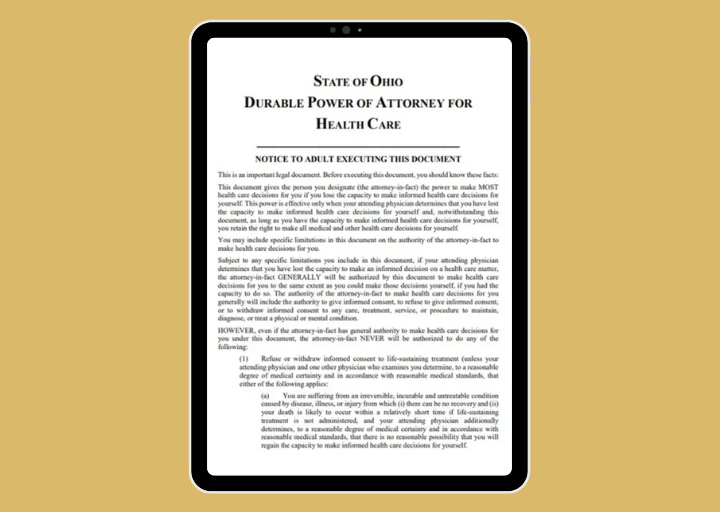
FREE RESOURCES
Our Free EBooks, Resources &
Video Library
Tools and resources to add to your knowledge and expand your understanding of a well thought out plan.

How to Choose the Right Guardian for Your Children
Naming a guardian for your children may not be the easiest part of estate planning, but it is without a doubt one of the most important. For parents in Ohio, this decision determines who will care for your children if the unexpected happens. At Boone Legal, we often remind families: if you don’t make this choice yourself, the courts will—and it may not be who you would have chosen.
In this guide, we’ll walk you through the key steps in naming a guardian, what happens if you don’t, and why planning ahead brings peace of mind.
Step One: Align with Your Spouse
If you’re married, the very first step is making sure you and your spouse are in sync. It’s not unusual for couples to come into our office with very different ideas about who should care for their children. That’s okay—we have a process to help parents work through disagreements and find common ground.
The good news? Guardianship decisions aren’t set in stone. As your children grow, relationships shift, or circumstances change, you can update your choices. Flexibility is built into the process.
What If You Don’t Name a Guardian?
If no legal guardian is named, Ohio’s probate court will step in. Judges, though well-meaning, make decisions based on very limited information: things like credit history, employment, and who else lives in the household.
This process is not a thorough, weeks-long evaluation of what’s best for your child. Instead, it’s a quick decision made from incomplete data. Without your input, the outcome may be far from what you would have wanted for your children.
Naming Guardians the Right Way in Ohio
To take control of this decision, you need a last will and testament. This is the document where you can officially nominate guardians for your children.
Ohio law requires that a will be signed in front of two disinterested witnesses—people who are not related to you and not named in the document. Once executed properly, the will is legally valid and will be recognized by the court.
This one step alone can make the difference between stability and uncertainty for your children.
A Will Isn’t Enough: Planning for Temporary Incapacity
Here’s something many parents don’t realize: guardianship planning isn’t just about what happens if you die. What if you’re in a car accident and hospitalized for several weeks? Or undergoing surgery and temporarily unable to make decisions?
In those cases, your children still need a safe, trusted adult to step in immediately. Without planning, Child Protective Services could become involved while the courts sort things out.
The solution is temporary guardian nomination forms. These documents give specific people permission to care for your children overnight, take them to school, and make decisions on their behalf until you recover.
The “B+ Decision” Is Better Than No Decision
Many parents delay naming a guardian because they can’t decide on the “perfect” choice. At Boone Legal, we remind families: a B+ decision is better than zero.
No one is perfect, and your choice doesn’t have to be permanent. What matters is that you have someone in place—someone who can step in if the unthinkable happens.
How Boone Legal Supports Ohio Families
At Boone Legal, we’ve helped countless parents in Stow, Akron, Summit County, and across Northeast Ohio put the right plans in place. From drafting wills and guardianship documents to creating trusts and full estate plans, we guide families with compassion and clarity.
We know these conversations can be tough. That’s why we approach estate planning with a mix of professionalism, empathy, and a touch of humor—it’s about making serious topics feel manageable.
Protect Your Kids’ Future Today
If you have children, naming a guardian is one of the most loving and responsible steps you can take. Don’t leave such an important decision to the court system.
Let’s make sure your kids are protected—no matter what life brings.
👉 Visit www.boonelegal.com to schedule your consultation today, or call us at (330) 968-6003.
Leave a legacy, not a mess.

FREE EBOOK
Reveals the #1 Secret to Keeping Your Money AND Your Kids Safe
Read this book & you'll know your kids & money are taken care of, in case anything happens to you.

FREE GUIDE
A How to Guide on how NOT to handle your estate planning for loved ones
Get the answers to 2 burning estate planning questions... and 1 that nobody ever wants to think about.

FREE RESOURCE
If you are unable to make your own decisions, who will do it for you?
Receive our Health Care Power of Attorney & Living Will forms AND a step by step tutorial on how to designate someone to make these decisions for you.
Funding Your Trust: The Critical Step Most Ohio Families Miss
One of the biggest mistakes I see as an estate planning attorney in Ohio is families who go through the time and expense of creating a trust—but never fund it.
A trust without assets is like a treasure chest that’s completely empty. It might look impressive sitting there, but when your family needs to rely on it, they’ll find nothing inside. That mistake can send everything you’ve worked for straight into Ohio’s probate court—the exact process most families were trying to avoid.
What Is a Trust, Really?
Think of a trust like a treasure chest. While you’re alive, the lid on the chest is open, and you’re in charge of what goes inside. You are both the owner and the trustee. That means you control the chest, and you decide how its contents should be handled after your lifetime.
When you pass away, the lid on the treasure chest closes. At that point, only the trustee you’ve named in your documents—called your successor trustee—has the key. Their only job is to open the chest and follow the roadmap you left for them.
But here’s the catch: if you never place your assets into the chest, there’s nothing for your trustee to manage. Instead, your property gets dragged through Ohio’s probate court.
The Problem of an Unfunded Trust
An unfunded trust leaves families with the very headaches the trust was meant to prevent. When assets aren’t properly placed inside, they fall outside the plan. That means they’re distributed according to Ohio’s probate process, not according to your carefully written instructions.
Probate is costly and time-consuming. Even simple cases take six months or more, and complicated estates—especially those involving homes, farms, or businesses—can drag on for years. Every step involves attorney fees, court filings, appraisals, and administrative costs that eat away at the estate.
And probate isn’t private. The proceedings are public record, meaning anyone can look up what you owned and how it was divided. For families who value their privacy, this can feel like a violation.
Most painfully, probate often sparks conflict. Siblings argue about “what Mom or Dad would have wanted.” Disagreements that could have been prevented by clear planning spiral into resentments that last a lifetime.
Why Funding Matters More Than Documents Alone
Creating a trust document is only the first step. A trust without assets is nothing more than paper. The true power of estate planning comes when you actually transfer your property into the trust.
That’s when your treasure chest is filled with the things that matter—your home, your bank accounts, your life insurance, even your car.
When the chest is properly filled, your family avoids probate entirely. Your successor trustee can step in, open the chest, and carry out your instructions with no interference from the courts.
How to Properly Fund a Trust
So what does it mean to fund a trust? It means retitling assets so that they belong to the trust rather than to you as an individual.
That can include your house, your checking and savings accounts, life insurance policies, and even vehicles. Some retirement accounts are handled differently, but in many cases, beneficiary designations can be aligned with your trust so everything works together seamlessly.
The key is not just setting up the trust once and walking away. Funding needs to be checked and updated regularly. Families buy new property, open new accounts, or switch insurance providers.
If those assets aren’t added to the chest, they’re at risk of falling back into probate.
The Benefits of a Fully Funded Trust
When a trust is properly funded, the difference for your family is dramatic. There’s no probate, no drawn-out court process, no public record of what you owned. Instead, the transfer of your estate is private, efficient, and exactly the way you intended.
Your successor trustee simply follows the plan you left, distributing assets to your children or other loved ones according to your wishes. There’s no confusion, no fighting, no unnecessary costs. It’s the smooth, thoughtful transition every family deserves.
How Boone Legal Helps Families Protect Their Legacy
At Boone Legal, we help families across Ohio not just create revocable living trusts but also fund them properly. That’s the critical step too many people skip, leaving their loved ones exposed to unnecessary stress.
We believe estate planning is about more than documents. It’s about protecting your children, preserving your privacy, and ensuring your legacy brings peace rather than conflict. Through our Family Wealth Planning Session™, we guide you step by step through both creating and funding your trust so that your plan actually works when your family needs it most.
Ready to Protect Your Family’s Future?
Don’t leave your treasure chest empty. Make sure your trust is funded and your family is protected. Call us today at (330) 968-6003 or schedule your Family Wealth Planning Session™ at www.boonelegal.com.
Leave a legacy of love, not a mess.
❤
Kristen Boone & the Boone Legal Team
The #1 Estate Planning Mistake Families Make in Ohio
If you don’t make a plan, Ohio will make one for you.
That is the number one estate planning mistake I see in my office week after week: families who assume that when the time comes, things will simply “work themselves out.” But here’s the truth—when you don’t make decisions, the state of Ohio makes them for you. And the state’s version of your plan rarely looks anything like what you would have wanted for your family.
Instead of peace, your loved ones are often left with probate court. They’re saddled with unnecessary costs, long delays, and the loss of privacy. Even worse, they may see the assets you worked so hard to build divided in ways that stir up conflict instead of strengthening relationships.
Let me tell you a story that makes this painfully clear.
Bob and Mary’s Farm: A Family Caught Off Guard
Bob and Mary had been married for more than 30 years. They built a life together on their 3,000-acre farm in Ohio, raising four children who each had very different paths in life. Their oldest son made farming his livelihood, working the land every day. Their oldest daughter loved her parents dearly but had built her own life out of state and had no real interest in the farm. Their second son often struggled with money, turning to his parents and siblings whenever he needed financial help. And their youngest daughter became the family’s caregiver, handling medical and financial matters for her parents while trying to hold everyone together.
When Mary passed away, Bob was left grieving and overwhelmed. Like many surviving spouses, he didn’t make changes to their estate plan. He assumed the documents they had prepared years ago were “good enough.”
But they weren’t.
When Bob died, the farm and the rest of his estate were pushed into Ohio’s probate system. Instead of passing smoothly to his children in a way that reflected their different circumstances, the law required the property to be gathered, sold, and divided evenly.
The results were devastating. The son who farmed the land lost the very property that sustained his livelihood. The son with money problems began pestering his siblings for cash. The daughter who lived out of state pulled away to avoid the drama. And the caregiving daughter—the one who had always been at her parents’ side—was left trying to manage the chaos without a roadmap.
A family that could have been united by love and legacy was instead divided by confusion, delays, and stress.
What Probate Really Looks Like in Ohio
This is the reality of probate in Ohio. Families often imagine that probate is simply “paperwork” or a minor legal step. But in truth, it is a long and expensive process. Even the simplest probate cases take at least six months. When the estate involves a farm, a family business, or other complex assets, the process can drag on for years.
On top of the delays, probate brings heavy costs. Court fees, attorney fees, appraisal costs, and administrative expenses all chip away at the estate. Families who thought they were leaving a gift often discover that a significant portion has been consumed by the process itself.
Privacy is another casualty of probate. Because the proceedings are public, anyone can look up what you owned and how it was divided. For families who have spent their lives working hard and protecting their privacy, this exposure often feels like a final insult.
Perhaps most damaging, probate breeds conflict. Without clear instructions from you, siblings are left to argue about what “Mom or Dad would have wanted.”
Disagreements that could have been avoided spiral into resentment, fractured relationships, and even litigation.
Why a Will Isn’t Enough
Many people assume that because they have a will, they’ve done enough. Unfortunately, that is one of the biggest misconceptions I see as an estate planning attorney in Ohio. A will still has to go through probate. That means all of the same delays, costs, public record issues, and risk of family conflict still apply.
Bob and Mary’s family illustrates this perfectly. Their will did not protect their children from probate. It did not preserve the farm for the son who had devoted his life to it. It did not create a strategy for the child who struggled financially, or support the caregiving daughter who had taken on so much responsibility. It simply sent everything through the court system—and the result was a family divided.
What families really need is a comprehensive estate plan that looks at their unique dynamics, protects their assets, and avoids probate altogether.
Planning for Real Families
Every family in Ohio has its own story. That means every family also needs its own tailored estate plan. For business owners and farmers, the most pressing question is often who will take over the business or land. For parents of children with financial struggles, the question becomes how to provide support without encouraging dependency. For families with heirs living out of state, the issue is often how to keep things simple and avoid unnecessary travel or disputes. And for families with one child who has taken on the role of caregiver, clarity is essential so that child is not left carrying the weight of uncertainty or accusations of favoritism.
Estate planning is not about filling in blanks on a form. It is about making thoughtful decisions that reflect your family’s reality and values.
Why Timing Is Everything
So many families delay estate planning because it feels overwhelming, or because they believe they’ll have more time later. But as Bob and Mary’s story shows, waiting only makes things more urgent—and more difficult—for those left behind.
When one spouse dies, the surviving spouse is suddenly single under Ohio law, and the protections they had as part of a married couple shift dramatically. Grief often keeps them from making good decisions, and illness or incapacity can arrive without warning, leaving no time for careful planning.
The best time to plan is not tomorrow. The best time is always now.
How Boone Legal Helps Families Leave a Legacy
At Boone Legal, we believe estate planning is not about documents—it’s about people. It’s about making sure your kids are protected, your business or farm is preserved, and your legacy brings peace rather than conflict.
Through our Family Wealth Planning Session™, we guide you step by step to get organized, to understand the difference between probate and trust planning in Ohio, and to make decisions that reflect your unique family and goals. More than anything, we help you leave behind peace of mind, not chaos.
Ready to Protect Your Family’s Future?
Don’t let Ohio write your family’s story. Protect your kids, your business, and your legacy by creating an estate plan that avoids probate, preserves privacy, and reflects your values.
Call us today at (330) 968-6003 or schedule your Family Wealth Planning Session™ at www.boonelegal.com.
Leave a legacy of love, not a mess.
❤ Kristen Boone & the Boone Legal Team
Need Help Now? Call us at 330-968-6003
WATCH NOW
LEARNING MOMENTS

-
Boone Legal LLC
4466 Darrow Road, Suite 18
Stow, Ohio 44224
-
-
(330) 968-6003
About Us
We have developed unique systems to give you the same access to a lawyer as was previously only available to the super-wealthy, so you can have the guidance you need to build and maintain a life of prosperity and wealth. And, with our planning systems you can keep your family out of court and out of conflict, which is the greatest risk to the people you love and all you have created.
Copyright © 2023 Boone Legal All Rights Reserved
DISCLAIMER: No information you obtain from this website or its content is legal advice, nor is it intended to be. You should consult an attorney for individualized advice regarding your own situation. No attorney-client relationship is intended or formed by your viewing this website or downloading and using the content, forms, tips or information kits found on this website. No attorney-client relationship is intended or formed without a fully-executed, written agreement to enter into such a relationship. Client testimonials or endorsements do not constitute a guarantee, warranty, or prediction regarding the outcome of your legal matter.